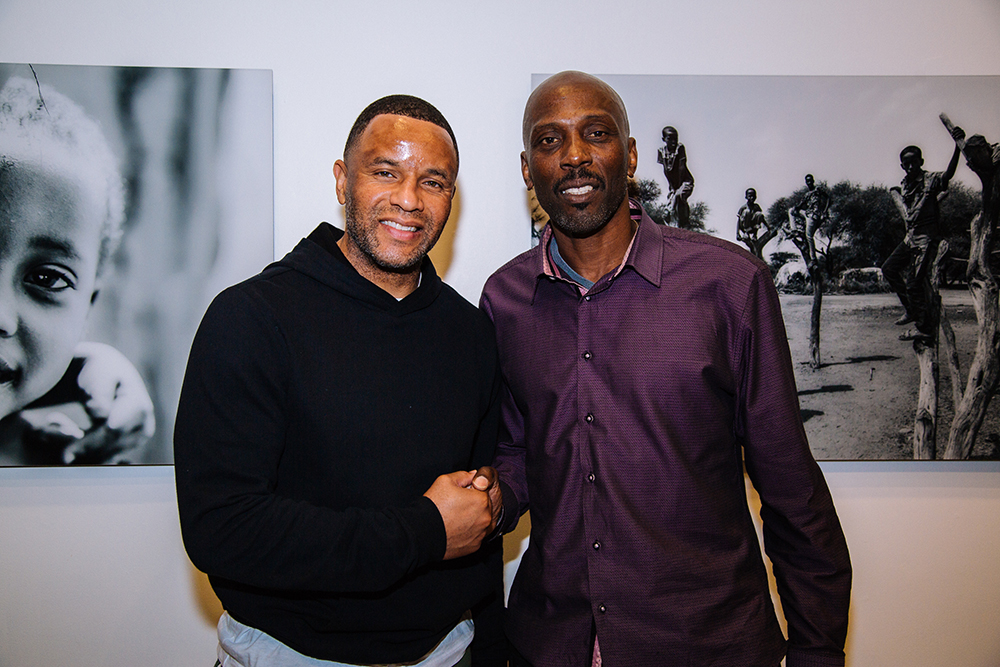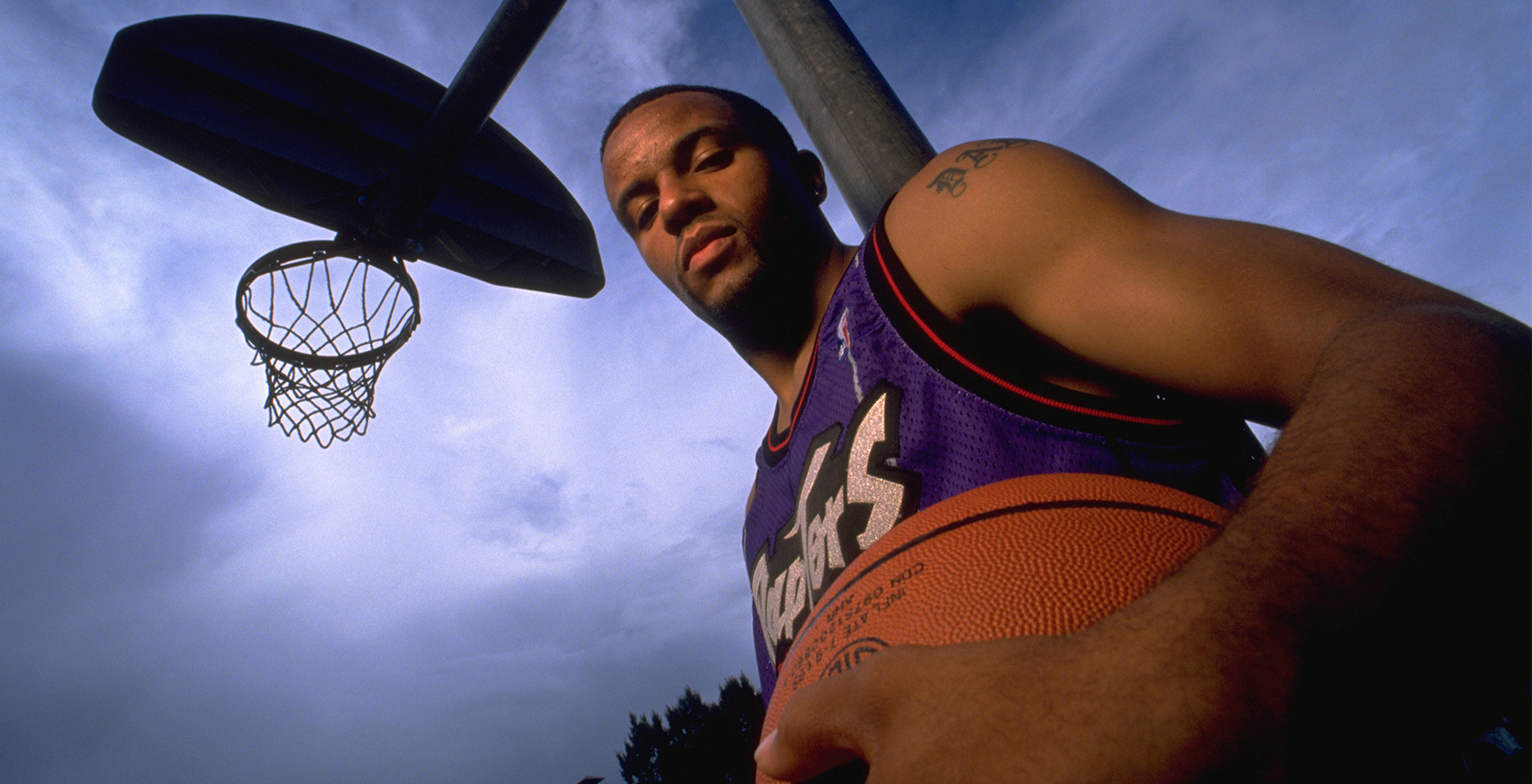We Asked Damon Stoudamire How He’d Coach the Raptors, and If There’s an Anti-Canadian Bias in the NBA
If you, like me, are a Toronto basketball fan, then you may feel like you’ve just entered your darkest timeline. The Raptors have been swept by LeBron James for the second straight year in a row; head coach Dwayne Casey has been canned; critics are calling on the team to blow up their core; DeMar DeRozan is in a bad way. What’s more, it feels like the entire league is actively conspiring against us. But you know what? Things could be much, much darker.
Just ask Damon Stoudamire. As the Raptors’ first-ever star — drafted seventh overall out of Arizona — the man they called Mighty Mouse was the sole bright spot on an otherwise godawful team. In their debut 1995-96 season, the Raps won just 21 games, had a goofy, Jurassic Park-informed dinosaur logo, and played in a makeshift basketball arena for a fanbase that wasn’t quite sure how the game worked.
Fast forward to today: the Raps are coming off a franchise-best 59-win season, boast one of the most fervid fanbases in the league, and have inspired a new, thriving generation of homegrown, Canadian NBA superstars. The latter point is explored in True North, a captivating new NFB/Red Bull TV documentary series that chronicles the rise of Toronto as a booming epicentre for world-class basketball talent, featuring appearances by stars like Stoudamire, DeRozan, Steve Nash, and Cory Joseph.
To Stoudamire, perspective is everything. We recently sat down with the Raptors point god to get his sage outlook on the team’s current struggles, the future of Canadian basketball, and the perceived anti-Toronto bias within the NBA.
I went to the premiere for True North the other day, and during your pre-screening introduction you said something that caught my ear: “Use basketball — don’t let it use you.” What did you mean by that?
Your shelf life in athletics is short. That’s why most people remember the struggle of getting there more than they remember when they got there. I played 13 years and after a while it becomes a blur. So there’s struggle and the process of getting there, and then there’s life after, which means you’re likely talking about, if you’re lucky, living another 35 years. So 20 per cent of your life, really, is spent playing professional sports. My message is just to build a lot of relationships, meet a lot of people, and do things the right way. It’s not about you. No matter how much you think it is about you, at some point the ball won’t bounce. You’ve got to put it down. And now who are you? Don’t let this — don’t let sports, don’t let basketball — make you. Don’t let it define who you are as a person.
How’s life after basketball been for you?
It’s been good. I’ve been coaching. I was [an assistant coach] in the NBA for two years and then I left. I’ve been coaching in college for six years, and been a head coach [at the University of the Pacific] for two. So it’s been exciting. It’s been eye-opening, but I’ve enjoyed every minute. I still miss playing. I think this would be the my ninth or 10th year out, and I played 13 years. And I’m like, the further you get away from the game, who are you? But I still do a lot of the same things, the only difference is I’m helping kids now. Helping them see a vision and helping them with their journey.

Let’s take it back to the beginning of your journey. When you started playing for the Raptors, did the city strike you as a basketball town?
No. When I first got here it wasn’t a basketball town. There was more hockey, there was more baseball. Matter of fact, I would say the hockey team was struggling a little bit when I got here. Roger Clemens won the Cy Young, but the Blue Jays weren’t that good. So, it was a sports town, but at the time a lot of sports teams were struggling. I think that the energy was there — 50 per cent of the city loved basketball, the other 50 per cent was trying to understand it, getting more acclimated and introduced to it. And as it went along, it started getting better.
Well, there’s been this longstanding notion that NBA players don’t really want to play in Toronto, be it for the cold weather or issues like customs and taxes. Did you feel any of that trepidation yourself?
I really didn’t pay attention to it, to be honest with you. You know, from a tax standpoint, once you make a certain amount of money that’s just what it is — you’re in that tax bracket anyway. Whether you’re in the States, whether you’re in Canada, whether you’re in Italy, it doesn’t matter. So I never looked at it that way. I was living my dream when I was playing out here. That was the biggest thing. And I think that perception has gone away. There were a lot of excuses for not playing here, but I don’t think people look for excuses anymore. Toronto is one of the most diverse, multicultural cities in this world. So why wouldn’t you want to live here? When I look at this city, this is like a New York-type of place, but it’s just, you know, not as dirty. You have everything here. You have the sports team, you have the shopping, and you’ve got the energy, the vibe. It’s a great city.
When you played were you already beginning to hear about rising stars coming up through Toronto’s basketball system?
Yeah! When I played here, obviously I heard of Jamaal Magloire. Then, when I left, I started to hear more about players up here in Canada. And then, ironically enough, I already knew some of those guys from when I was playing here. It’ll just continue to get bigger and bigger and bigger. We’re at a point now where you think about grassroots basketball here in Canada, here in Toronto, you’ve got anywhere from what we call “high majors” to “low majors” — you can find all levels of what you need. And I think it’s turned into a hotbed for college recruiting, because there are so many players here. I mean there’s been such an evolution that they’ve created their own version of the McDonald’s All-American Games here in Canada. That was unheard of 20 years ago. So Toronto, to me, is like the New York City of basketball. It’s the Mecca. I would consider Toronto the Mecca of Canada.
What would you say your part was in all this? What impact did you have on Canadian basketball?
From the beginning, I think I helped give fans of Toronto, and even those on the real low grassroots level, something to identify with. I was one of theirs. They got a new team and it was important to have a face of that franchise. That was big for the city; it was big for the youth. And that’s the role I played. Obviously, you know, Vince Carter comes, Chris Bosh comes, but I think now, when you think about Toronto, you think about the Raptors. It’s a team. I don’t know if they’ve got a star like that now. From an individual standpoint, the guys they have now might not have the star power, so to speak, where you’re putting them on the bill. Back then it was more myself, but now, it’s the team. The city identifies with the team. The Toronto Raptors are their team, the same way the Maple Leafs are their team. You walk around the streets today and people are still disappointed that they didn’t beat Cleveland. It wasn’t like that probably even last year. Everybody was just happy to be in those conversations. That’s the evolution of basketball here.
That’s great, though True North also explores some of pitfalls of youth basketball in Toronto — particularly when it comes to shoe company sponsorships. Not only do major brands like Nike, Adidas, and Under Armour sponsor college basketball programs, they also run three major grassroots (or AAU) circuits. But it sounds like there’s a dark side to all this, where players are almost bribed to play for certain teams…
I would say there’s a lot more that goes into grassroots basketball than what people know. The number one thing out the gate is, we’ve got to give these coaches and program directors a bit more credit, because they’re investing a lot into these kids. You don’t get a shoe contract with one team or one player — that’s not how it works. So you’ve got to put a program together, and you’ve got to support like five, six, seven teams. I’d say to have one premier 17-and-under AAU team, you’d probably need $120,000. Okay, so what does that entail? Top players’ parents going on trips, paying for food, paying for all the little miscellaneous things because club fees are not going to pay for that. So that’s why I say there’s more to it than just a shoe affiliation. Because what is a shoe affiliation? Everybody’s getting money and getting gear but that money is only going to go so far. Now, the reward at the end of the day is, hopefully somebody within your program is able to make it to the pros and now he gives back to the program, or maybe he doubles back some of his contract into the program. That’s how he helps. Nothing’s wrong with that. I think where things become a little shady is when you’ve got the advisers trying to prey on the less privileged, and that’s not cool. Because now, to me, you’re not giving people an opportunity to choose things for the right reasons. You might have two teams and one team might be a better fit, but this team is doing a little bit more, so then you tend to lean more over here. That’s why you see so much disloyalty among these kids. And we get mad at the kids, but behind the scenes, there are strings being pulled on the kids. That’s what’s disappointing.
The downfall is that it has become such a big business. I always laugh. I’ll talk to some AAU coaches and I’ll be like, “Man, it’s free agent season. What y’all doing, calling around to see who didn’t play enough last week to see if they’re going to switch teams this week?” Because that’s just what it is. I tell people this all the time so they keep it in perspective, especially people that run programs: if you’re doing it for the right reasons, you will get mad for the right reasons; if you’re doing it for the wrong reasons, you will get mad for the wrong reasons. There’s going to be some change, there are going to be people leaving. You might be a victim, but eventually you will get some players the same way. So that’s where the pitfalls are and, to me, where the disappointment comes in. There’s not a lot of loyalty in this game, in certain respects. We talk about loyalty, but loyalty has to be a two way street.
One guy in the movie even compared the AAU system to slavery. Do you think he was being a bit extreme?
I don’t disagree with some of the things he was saying. I mean, he might have been talking over people’s heads a bit, but if I’m not mistaken, he was more so alluding to the AAU with a little mixture of the NCAA system. Because you have so many people doing things for the wrong reasons. And that’s what I say, it takes away from the art. To me, the game used to be pure. Now the game’s not pure. And what I mean by that is, you might go see a player and maybe the 10th ranked player isn’t as good as the 150th ranked player. And the reason might not be fair — it’s because the 10th ranked player was going to these camps and the other 150th ranked player didn’t want to go. So he got caught up in the politics of the game. That’s something that you can’t control. That, to me, is when the game becomes impure. And that’s when you lose the art of what we’re really doing, because I think in this day and age, it’s definitely a lot easier to get scholarships. If you just put in the work, it doesn’t matter if you were a shoe affiliate or non-shoe team — if you put in the work, we’ll find you, because there’s just a lot of platforms with social media and different things where you can see kids that you just couldn’t see back in the day.
You touched on the Raptors losing to the Cavs a bit earlier. Any thoughts on the state of the Raps right now?
I mean, in this series they lost to a better team and they had the best player. I think the Raptors are a victim of being in the era when LeBron James is just the best player. Even with what many are considering a down Cleveland team, he’s still able to elevate them. I always say that you can never underestimate the heart of a champion. Until somebody beats that guy, you can’t have him as the underdog. Everybody found that out in this series. What Toronto needs to do is, you’ve got to sit back and evaluate everything. I don’t think a hasty decision, whatever it is they might be thinking, is going to be the answer. [Editor’s note: This interview took place before the Raptors fired head coach Dwayne Casey.] You’ve got to sit back, evaluate, and let things die down. You’ve got to digest the positives of the season; the negatives are the things you want to improve on, but they had a hell of a season. They’re not the first No. 1 seed to lose; the Dallas Mavericks were the No. 1 seed and lost to Golden State, the No. 8 seed. So it’s happened before. The disappointment is there, but at the end of the day only one team is going to win the championship, so everybody’s going to be disappointed. Perspective is this: if you lose to Cleveland in the conference finals, are you as mad as you would be losing to them in the semi-finals? As a fan, if you want to win a championship, that’s cool. But if you just wanted to get to the next round and get beat by LeBron, what difference does it make? I think they’ll do the right thing. They have a great organization, they’ve got great leadership. Nobody who makes hasty decisions ends up in the right place. In a business, you obviously can’t think like that.
So the Raps are cursed with playing in the same era as a once-in-a-lifetime, generational player. You’ve got some experience with that, too. What was it like playing in the Michael Jordan era?
It’s probably the same thing a lot of these guys are experiencing. You come up in the wrong era, you can help that. To me, whatever team LeBron ends up going to — if he stays in the Eastern Conference or not —is the odds-on favourite until he gets beat. He’s been to, like, seven straight finals, but everybody is writing him off. I don’t get it!
You’re a coach now. If you were to coach the Raptors today, what advice would you give them on beating Lebron? What changes would you make to their game plan?
When I watch the games now I watch it from a total fan perspective, so I couldn’t even give you an educated answer on that. I just know that to play against LeBron, you’ve got to go at him. That’s what I’d do. You can’t play in fear against a player like that. You’ve got to attack him, because he’s definitely attacking you. Like I said, I think the Raptors had a heck of a year and everybody just needs to sit back, digest it, and move on. They did get out of the first round this year, they got to the semis, and right now LeBron James, he seems to be their kryptonite. Just a thorn in their side — kind of how Michael Jordan was to the Cleveland Cavaliers in my era. Probably a lot of it is mental, until you win a game. What this now, two years in a row the Raptors got swept by LeBron? Until you actually beat them, going in, it’s hard to say it’s not in the back of your mind. So until they actually beat him in a playoff series, it’s always going to be there.
I spend a lot of time on the Raptors’ subreddit, and there are a lot of fans who think there’s an anti-Canadian bias in the NBA, and in the States in general. They point to everything from the refs beings against the team, to ESPN never wanting to show Raps on TV, even though they were the No. 1 seed this year. Is this something you’ve noticed yourself?
I don’t really notice it. The one thing I would say is basketball, and most of television, is about ratings. I think when Toronto had Vince Carter, they played the Raptors on TV a lot because it was Vince. And what I’m saying now is the Raptors are a good team collectively — it’s not about one individual anymore. So I think that’s what tends to get lost in the conversation. The NBA has turned into, for better or worse, a branding of the individual. If you were to look up the top 10 selling jerseys in the NBA right now, I’m willing to bet you Porzingis is in there. That’s why the Knicks come on TV more than the Raptors, because they’re in a big market. That’s just what it is; you can’t get by that unless you’re getting a top 10 player. And I’m not even saying Vince was a top 10 player at that time, but this is the difference: even if he wasn’t, he was a top five player in terms of excitement. People wanted to see that. When he was here, they only got past the first round one time. That’s the reality. But if you go back and look, they were probably played on ESPN 25 or 30 times a year when he was here. So I think that’s more it than anything.
I mean, the Milwaukee Bucks don’t come on TV and they’ve got one the top 10 players in the league in Giannis Antetokounmpo. I don’t think they don’t come on TV because it’s a bias — I think they don’t come on TV because people don’t like watching them. That’s kind of where we’re at right now with basketball. People watch Oklahoma City because it’s like watching the drama within the drama. Some teams, you want to watch them because you just want to see what’s going to happen. And with Toronto, you don’t really have that. It’s a 10-deep team and it’s the city’s team, but it’s not America’s team. That’s the difference. Personally, I don’t think it’s a bias, because if you make a trade today for — it doesn’t even have to be LeBron — but if you get Russell Westbrook, they are going to be on TV. Because there’s some drama behind it. I think we all gravitate to things like that.










